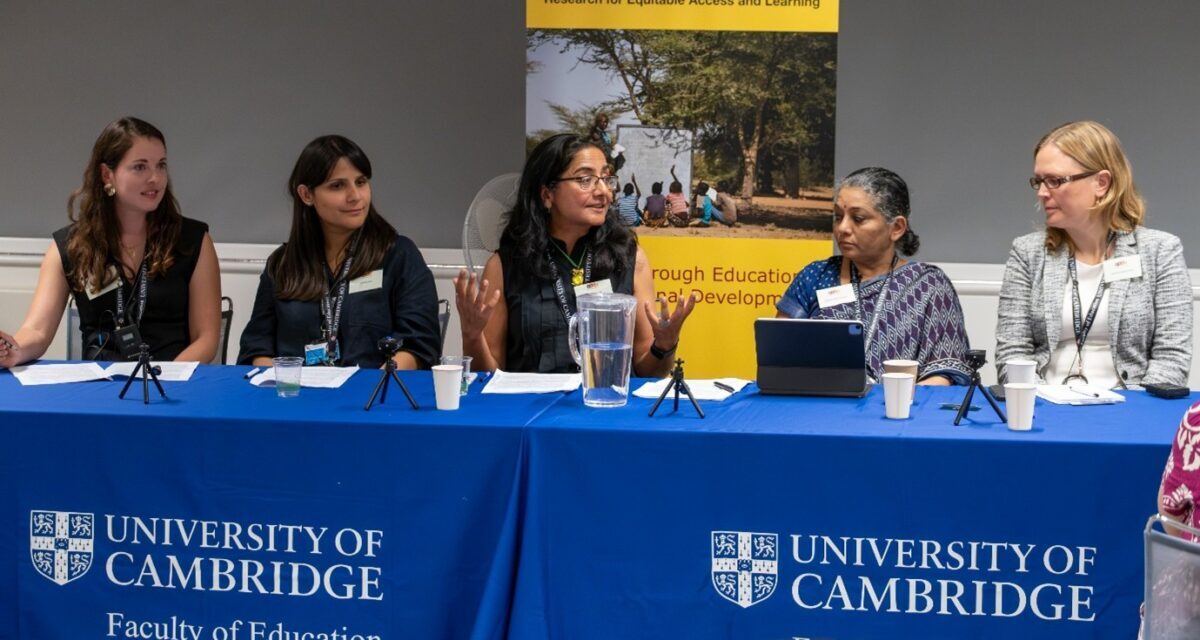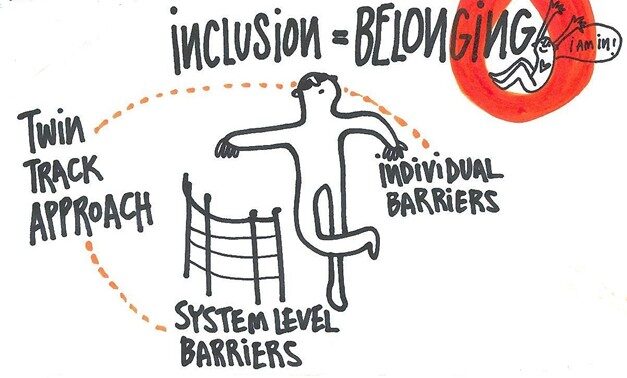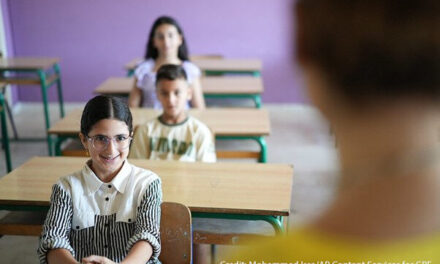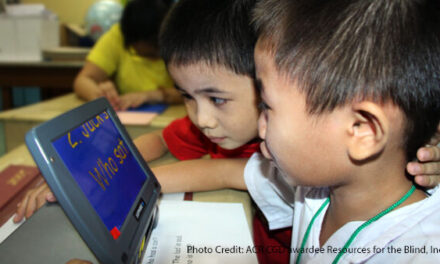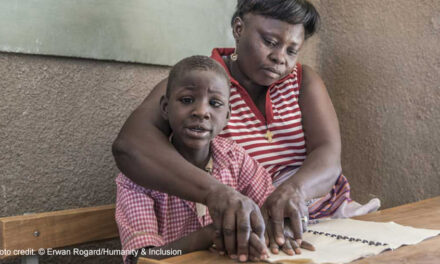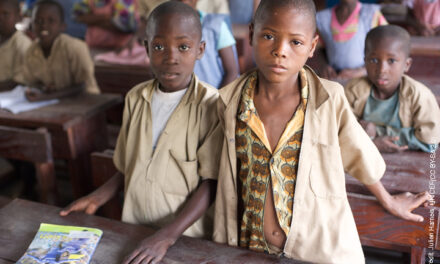This blog was written by Dr Stephanie Nowack, University of Oxford and Sakina Jafri, University of Cambridge.
This blog offers reflections on our panel discussion convened to mark the 10th anniversary of the REAL Centre. Chaired by Professor Nidhi Singal, our panel centred on the question: How can we move beyond tokenism to truly advance inclusive education?
You can watch the panellists speaking in this video:
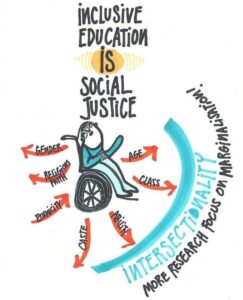 Persons with disabilities face intersecting barriers in education, compounded by gender, race and poverty. To address this, our panel highlighted research from the REAL Centre and the Cambridge Network for Disability and Education Research (CaNDER), exploring progress in disability-inclusive education, focusing on inclusive pedagogy, teacher education challenges, and the crucial role of universities and partnerships in fostering inclusive school cultures amid global uncertainties. We brought together our expertise as researchers, practitioners and policy specialists, each committed to advancing social justice through inclusive education. Through our reflections and provocations, we sought to move beyond theory, focusing on practice and innovative approaches to make inclusive education equitable for all. What follows are the central arguments shared by each panellist.
Persons with disabilities face intersecting barriers in education, compounded by gender, race and poverty. To address this, our panel highlighted research from the REAL Centre and the Cambridge Network for Disability and Education Research (CaNDER), exploring progress in disability-inclusive education, focusing on inclusive pedagogy, teacher education challenges, and the crucial role of universities and partnerships in fostering inclusive school cultures amid global uncertainties. We brought together our expertise as researchers, practitioners and policy specialists, each committed to advancing social justice through inclusive education. Through our reflections and provocations, we sought to move beyond theory, focusing on practice and innovative approaches to make inclusive education equitable for all. What follows are the central arguments shared by each panellist.
-
The ‘How’ of inclusive education is already happening: harnessing a pedagogy of play for autistic learners in South Africa (Dr Stephanie Nowack, University of Oxford)
Dr Stephanie Nowack began with a provocation: to understand how inclusive education works, we must look at what teachers are already doing in classrooms. Her research focused on a South African pedagogy of play for autistic learners. It highlighted that inclusion (and belonging) cannot be theorised in abstraction, it must be lived, felt and practiced. Researching in 12 pre-school classrooms, across three public autism schools in low-income communities, she undertook participatory research in partnership with South African organisations, building on the knowledge of educators. Her research embodied a key principle of advancing quality, disability-inclusive pedagogy: taking a strength-based approach that builds on the existing expertise of teachers. For teachers, education was not about charity, but about preparing autistic children for independence, employment and citizenship. Their play pedagogy centred around three interconnected practices: Exploration (making learning concrete), Enjoyment (encouraging happiness), and Empowerment (following children’s interests) – supported by trusting relationships and routines.
2. Centring intersectional identities and challenging systems (Sakina Jafri, University of Cambridge)
Drawing on her doctoral research with South Asian heritage teachers in London primary schools, Sakina Jafri highlighted how marginalised intersecting identities like race, disability and religion shape lived experiences and often hinder belonging and progression in schools in so called ‘developed’ contexts. Teachers with disabilities, while often overlooked, bring critical perspectives that challenge ‘norms’ and enrich school cultures with empathy and advocacy. Yet, many describe a system in London that fails them, offering little support, creating extra workload, and ultimately pushing some out of the profession. Teachers’ stories make it clear that inclusion is not a policy but a lived practice, one that must be intersectional and intentional. If we fail to include those who teach, we fail the foundation of our education systems. Research studies undertaken by CaNDER members with teachers across nine countries continues to amplify these voices, promoting equity in the teaching workforce and advocating for systemic change.
- Global alliances for teacher inclusion (Professor Mythili Ramchand, National Institute of Advanced Studies)
Professor Mythili Ramchand further addressed the marginalisation faced by teachers. She emphasised that teacher education must go beyond policy rhetoric. Programmes must offer safe, reflective spaces for educators to explore lived experiences of discrimination and develop inclusive pedagogic repertoires grounded in social justice. Universities have a critical role, especially amid policy upheavals in the Global South, where rigid regulation often limits the flexibility needed to respond to local school contexts. Initiatives like Connected Learning for Teacher Capacity Building in Stem (CL4STEM), a South-South collaboration supporting teaching in Nigeria, Tanzania and Bhutan using Universal Design Learning principles; and the South Asian Research Hub for Inclusive Education (SARHIE), which has its genesis in the first South Asia workshop hosted by CaNDER in Nepal in 2020. She showcased that cross-national partnerships among higher education institutions are essential to generating context-sensitive research, building learning communities and offering adaptable, open-access professional development opportunities which are key to enabling teachers as agents of change for inclusion.
- Inclusive education at every level: shared responsibility and respectful partnerships (Dr Hanna Alasuutari, World Bank)
Dr Hanna Alasuutari acknowledged the vital role of teachers but emphasised that inclusion is everyone’s responsibility. True progress requires systemic change, embedding inclusion at every level for all learners. Learners with disabilities must be considered from the start in all planning, discussions and decisions. Governments must take ownership, and stakeholders must engage with each country’s unique cultural and historical context. Hanna also highlighted power imbalances in partnerships with countries and shared insights on respectful collaboration principles. She stressed the importance of not offering pre-defined programmes but instead engaging Ministries of Education and country teams to identify relevant topics for deeper learning. Focusing on the work undertaken by the Inclusive Education Policy Academy, she reflected on how working with regional experts and connecting them with international inclusive education professionals had added benefits for knowledge exchange. It is centrally important to recognise and challenge power dynamics and support South-South collaborations, rather than relying solely on North to South partnerships.
Concluding reflections
Inclusive education is not a puzzle solved by any one country; it remains an ongoing challenge across both the Global North and South. However, our panel highlighted evidence-based insights to move discussions on inclusive education beyond tokenism. Inclusive pedagogy is not a fixed model to be exported or imposed. It is a relational, context-driven practice. True progress requires systemic change that embeds inclusion at every level, engages with each country’s unique historical context, and is grounded in respectful, power-aware partnerships. It also demands that we centre the lived experiences of educators who themselves face marginalisation due to disability, race and/or religion. Their perspectives offer powerful models of advocacy and empathy that showcase that the ‘how’ of inclusive education is already being practiced, not just imagined, in places that are often overlooked.
—–
This blog is part of a series unpicking issues discussed at the REAL Centre 10-year anniversary conference in June 2025. Others in the series include:
A decade of learning, a future of inclusion: The REAL Centre’s journey
The role of education in decolonisation, climate and conflict: A call to action
Elevating teachers’ voices to support equitable learning
“Where next?” Navigating a future for education and international development amid funding cuts

